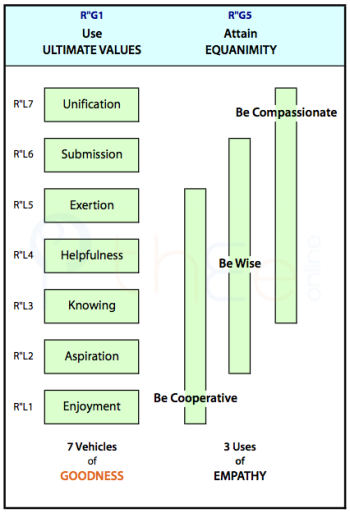Attain Equanimity: RsH"-G5
In you necessarily use humanity's . However …
… is limited by and releases .
In , you conscientiously use humanity's . However …
… is both limited by and releases .
In , you spontaneously use humanity's . However …
… is limited by and releases .
In , you thoughtfully use humanity's . However …
… is limited by and releases .
Now read on:
Using Your Individuality

An permits you to take a good approach to specific events, and any wider social turmoil. You are likely to strive to , because that is a comfortable state to be in.
The function of is to maintain goodness as a stable personal state despite surrounding dysfunction and destructiveness. The challenge here is to be able to remain comfortable and balanced while involved with others, however damaged or damaging they may be &/or however dire the social conditions.
Handling social situations through genuine involvement occurs through . is what makes it possible to appreciate the feelings and perspectives of other individuals and groups. It is not difficult to activate : it is the consequences of empathizing that may be difficult—feeling the intense pain, emotional dysfunction and damage within others.
![]() Your Egocentric Alternative: Just Switch Off!
Your Egocentric Alternative: Just Switch Off!
The effective use of specifically for is made possible by the addition of a 5th adjacent that is operated creatively. The result is three Pentads that serve as the and determine how empathy should function. It is the creativity requirement which makes rather difficult.
The three are:
- R"G53
- R"G52
- R"G51
Using Your Empathy
Be Compassionate: R"G53
is a fundamental spiritual requirement for , and is emphasized in all great religions. It appears with various names: love, caring, kindness, loving-kindness, devotion.
It is well understood that requires . What is less understood is that without , it will not be meaningful. A better term for «compassion without creativity» is sympathy.
The internal structure provides insights here that are often missing from conventional exhortatory accounts.
Details in next Topic.
Be Wise: R"G52
is the fundamental rational requirement for . It refers to understanding dynamic social situations where action must be taken. So applies to personal choices and also advice to another. Such is not about having vast knowledge or reasoning powers. It has to be learned through reflecting on experience, empathy with others, and awareness of values. So it often comes with age and maturity.
We are homo sapiens (L. sapientia = wisdom). In THEE, it is apparent that everyone can because it is a matter of willingness and awareness, not cleverness or book-learning. It is not commonly realized that requires creative , or that it is a consequence of .
The internal structure provides additional insights that are often missing from philosophical accounts.
Details in next Topic.
Be Cooperative: R"G51
is a fundamental practical requirement for . It must be obvious that you are always doing things with or for others, and that you have the option to participate properly or to remain half-hearted and poorly engaged.
maintains in difficult situations where some active contribution is appropriate. Note that it demands a creative orientation to , which is its highest internal level.
The internal structure provides a range of other insights here.
Details in next Topic.
- Examine the internal structures of the three .
Originally posted: 24-May 2013